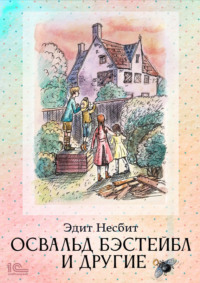 полная версия
полная версияThe Prophet's Mantle
'Why, Alice, I am very glad to see you; you're looking much better. Where are you off to? What are you doing?'
'Oh, dear, I'm so sorry, Mr Richard; I'm just going by this train to stay at Chislehurst with some friends of this gentleman's. Mr Petrovitch, Mr Ferrier.'
The men bowed—Petrovitch with easy courtesy, and Ferrier with a frigid reserve which would only allow him to raise his hat about an eighth of an inch—and as they did so the train steamed in.
'You must not miss this train,' said Petrovitch; 'there is not another for so long a time.'
'Good-bye, Mr Richard,' she said. 'When you see father or mother, tell them I'm well and happier, and have good friends.'
Ferrier had it on the tip of his tongue to tell her how he had just seen her mother, but Petrovitch, with an air of authority, cut short their farewells by hurrying her into the train.
'Good-bye,' said Richard, rather at a loss in this unexpected and bewilderingly brief meeting; 'couldn't you write to me? I'm at Guy's—Guy's Hospital, you know.'
'Stand back, sir,' said the guard, slamming the door with one hand and putting his whistle to his lips with the other, as the train gave a lurch and began to move off.
'Bon voyage, Mrs Litvinoff,' said Petrovitch, bringing a startled look and a vivid blush into Alice's face, and giving Richard the biggest surprise of his life. His blank astonishment was too evident for Petrovitch to ignore it. He looked at Richard inquiringly.
'Er—er, I beg your pardon,' stammered Ferrier, as soon as he could find words. 'You called that—a—lady Mrs Litvinoff?'
'I did, sir,' answered the other, with a rather angry flash of his deep-set eyes. 'I might have called her Countess Litvinoff, if you attach any importance to titles.'
'Good God!' said Richard, very slowly. He sat down on the wooden seat without another word.
'I wish you good-morning, sir,' said Petrovitch, making for the incline which leads off the platform.
Before he had made three paces young Ferrier had pulled himself together, and had overtaken him and laid a hand on his arm.
'Forgive me, sir—I am afraid you think me very strange and unmannerly—but I have a deeper interest in this matter than you can possibly imagine. I must beg you to allow me a few moments for explanation.'
'Certainly, sir; I shall be happy to walk your way,' answered the Russian, less stiffly.
No more was said till they got outside the station. It was not easy for Richard to know how to begin. He did not know how much this man knew of Alice, and he felt it would be unfair to tell her story, as far as he knew it, to one who seemed to know her only as a married woman. But, on the other hand, how much did he himself know of her story? He walked along beside Petrovitch for at least ten minutes before he could make up his mind how to begin. At length the other half-stopped and looked at him in a way that compelled speech of some kind.
'The reason I was so surprised when I heard you call that—lady Mrs Litvinoff, was that I have known her from a child, and did not know that she was married. I—I—also knew a Count Litvinoff in London a few months ago, and certainly did not know that he was married. The connection of the two names startled me. I must also tell you that it did more than startle me; it relieved me.'
'You are, then, very much interested in my friend?' said Petrovitch.
'Well,' said Richard, finding it desperately hard to break through his English reserve, and yet feeling that he could not in common fairness expect to get any information from one who called himself a 'friend' of Alice's without showing good reasons for asking for such information. 'Well, I am interested, very much interested, but not quite in the way that men generally are when they talk about being interested in a woman. Look here,' he said, stopping, and finding his powers of diplomacy absolutely failing him, falling back on the naked truth, 'that young woman has been the cause—the innocent cause, mind—of a complete separation between my brother and myself. I thought my brother had done her a great wrong. Can you tell me whether he did or not? His name is Roland Ferrier.'
'So far as I know Mrs Litvinoff's story,' said Petrovitch, speaking very deliberately, 'no wrong of any sort has ever been done her by any one of that name.'
'Ay, but,' said Richard, 'so far as you know; but do you know all? Do you know with whom she did go when she left her home?'
'I do.'
'It was not my brother?'
'It was not your brother.'
Richard had just said that he felt greatly relieved. If that statement was true, his looks certainly belied him.
'One question more,' he said. 'I want to know exactly how far wrong I have been. Do you know if my brother has had any communication at all with her since she left her home?—did he know where she was?'
'I believe that he has had no communication with her, and that he did not know where she was.'
'Can you tell me who this Litvinoff is, then? Is he the Count Michael Litvinoff that I know, or knew? If so, did he marry, and when did he marry her? and why did she leave him?—for she did leave some man; she told me so.'
'Ah,' said Petrovitch, 'you said one more question; that question I answered because I thought you were really concerned in knowing the answer. Forgive me, these other matters I think do not concern you.'
'Well,' Richard answered, 'I knew that girl when she was a baby, and I've always been fond of her, and I should naturally be glad to hear anything about her. I am glad to see her looking so much better, and better cared for than when I met her last.'
Petrovitch bent his head silently.
They had stopped by this time just opposite the Borough Market.
'I am sorry you will not tell me more about her; but since you have told me that my brother has not injured her in any way, I don't know that I have any right to ask you more. I must thank you for telling me what you have done, and ask you to excuse my seeming curiosity.'
Petrovitch bowed; young Ferrier did the same, and they parted—Petrovitch turned across the bridge, while Richard retraced his steps towards the station. He made his way to the telegraph office, and sent off this message:—'Richard Ferrier, Guy's Hospital, London, to Gates, The Hollies, Firth Vale.—Please wire me my brother's address at once if you know it.'
Then he crossed the station-yard, and ran down the steep stone steps which are part of the shortest cut to the hospital, and as he went he felt more wretched than he had ever been before. He had always believed in himself so intensely that an actual injury would have been less hard to bear than this sudden shattering of his faith in his own judgment. He had been so utterly mistaken—so wrong all round. Everything had seemed to point to his brother's guilt. Now everything seemed to have pointed to his innocence. If Richard's eyes had not been so blinded by—what? It was a moment for seeing things clearly, and Richard saw that his own passion and jealousy had perverted his view of all that had taken place in the autumn. That meeting in Spray's Buildings—of course it was the likeliest thing in the world that Roland really had seen Litvinoff, and at the thought of that sympathetic nobleman the young man ground his teeth. How completely he had been fooled! It must be the same Litvinoff—for had not Alice been present at his lecture in Soho? How had Alice met such a man? Oh, that might have happened in a thousand ways. Had Litvinoff really married her? Richard thought he had not. He remembered Litvinoff's moustache, and felt sure that he had not. Felt sure? How could he feel sure of anything, when here, where he had been so absolutely certain, he was proved to have been wrong?
What fearful blunders he had made—what a horrible muddle he had got everything into—what irretrievable mischief he had done! But, though he blamed himself deeply and bitterly, he still, not unnaturally, blamed Litvinoff with still more bitter earnestness. One thing only was clear to him. He must find Roland at once, tell him all the circumstances, and beg his pardon. It would be all right again between him and his brother, towards whom he now felt a rush of reactionary affection. But how about the mill hands, now scattered far and wide beyond recall—beyond the reach of his help—through this same mad folly of his? In an impulse to do something for at least one of those who had suffered through him, he turned off from the hospital and took a hansom to his rooms, where he unlocked his desk, and, taking a five-pound note from his slender stock of money, enclosed it in an envelope, which he addressed to Mrs Hatfield at the address she had given him, in a hand not his own. He would do more for them when he and his brother had begun to work the mill again. That would be one big result of his new knowledge. His medical studies would be at an end, and he would be once more Ferrier of Thornsett. But that was poor compensation for all the rest.
When Mr Gates' answering telegram came it was a wet blanket on Richard's longing to make his confession and talk things over with Roland—for it ran thus:—'Robert Gates, The Hollies, Firth Vale, to Richard Ferrier, Guy's Hospital.—Don't know his address—he is expected here in a few days. Has left Chelsea, and is making visits on his way here. Glad you want him. Letter follows.'
So he could not see Roland that day, after all, and there was nothing for it but to possess his soul in patience until he heard again from Gates. So he spent the evening with some congenial acquaintances who had diggings in Trinity Square, and managed to get through the night without being driven to distraction by his remorseful self-tormenting thoughts. But the next morning he remembered, with a start, for the first time, that, not content with believing his brother to be guilty of a disgraceful action, he had accused him of it to Clare Stanley, and, worse than that, to Alice's own mother. He felt he could never face Clare again after that, come what might. But the Hatfields? At least it would be only fair to make what reparation he could by undeceiving them. He would go down to Dartford that very day, and tell them how mistaken he had been. He went by the same train which had carried Mrs Hatfield thither on the preceding day.
Arrived at Dartford the Dismal, Richard betook himself to the address that had been given him, which, after some difficulty, he found to be one of a row of small, ill-favoured, squalid cottages a little way out of the town. There were a good many children about, who stared at him with open-eyed curiosity, and did dreadful things to their mouths with their grimy little fingers in the excitement of seeing a gentleman stop at No. 5 Earl's Terrace. The battered, blistered green door had no knocker. The handle of Richard's umbrella afforded an impromptu one, and, in answer to the spirited solo which he proceeded to execute with it, the door was opened, and by his foster-mother herself.
She looked very pale and worried, and had evidently been crying. She didn't seem surprised to see him; she was in that state of mind when nothing seems worth being surprised about.
'Come in, lad,' she said. 'Ah got thi kind token. Ah know'd 'twas thee as sent it, and m'appen Ah'll need it more nor tha thowt when tha sent it, for t' maister's giv' up his work an' gone off.'
She had set a chair for him, and as she finished this speech she sat down herself and looked hopelessly at him.
'Gone—gone! Left you! Why, he must be out of his mind.'
'His mind's right enough; it's his soul as Ah'm feared about, Dick. He's gone to have it out wi' Rowley, and get at the rights of it.'
'But where is Roland? Where's he gone to?'
'He's gone to Thornsett.'
'Why, Roland isn't there.'
'Thank God! God be praised, if it'll on'y please His good providence to keep 'em fra meetin'!'
'But how came he to go? How did it happen? Tell me all about it?'
It seemed that when her husband had met her at Dartford Station, she, pleased with having met Richard, had told him of the rencontre. That he had closely questioned her, and when at last he had learned every word that had passed between them, he had turned suddenly on her, and told her that this was the first time he had ever even thought of such a thing being possible as that Roland had been the cause of Alice's ruin, and that now he did know he would not lose a day in facing him with the accusation.
'Do you mean to say,' said Richard, 'that it's through me he thinks that Roland took her away?'
'I don't say it was thy fault, lad. I'm more to blame than thee. I should a-kept my clattering tongue quiet, and I should a-known my own man better after a' these years nor to think that if he had a-thowt it was Rowley he wouldna ha' faced him wi' it long sin'.'
'This is devilish pleasant!' said Richard, rising and taking a stride across the little room; but how did he go?'
It appeared he had started off with but a pound, or little more, in his pocket, intending to walk the greater part of the way, and only telling her that she wouldn't hear of him until she saw him back again.
'And what do you think will happen when they do meet?' he asked.
'Oh, Ah'm feared to think!' she said, wringing her hands and beginning to weep.
'I'll tell you what I'll do,' said Richard. 'I'll go straight down to Thornsett now, and keep a look-out for Hatfield. I'll stop any more mischief, any way. I think I can promise you that nothing much will happen if they do meet.'
She caught hold of his hand, and began to thank him.
'Oh, don't thank me!' he said; 'the whole sad business has been my fault from beginning to end. I found out yesterday, almost directly I left you, that Rowley was as innocent of doing any harm to Alice as I am, and I found out, too, that she is well and pretty happy, and, I heard, married. If it hadn't been for me, Hatfield wouldn't have gone off on this wild-goose chase. But I must get back now; my train goes in twenty minutes, and I want to catch the three o'clock train for Firth Vale.'
He caught the three o'clock train to Firth Vale, having managed, by a very hurried farewell, to escape the torrent of questions Mrs Hatfield would have liked to pour out. He felt that, all things considered, the less he said about the matter the better. He had been wrong too often, and too much.
CHAPTER XXVII.
MAKING IT UP
THERE was rejoicing in the house of Robert Gates, as over a prodigal returned, when Richard Ferrier avowed that he had been mistaken all through in his quarrel with his brother, and that he was now only anxious to acknowledge his error, and to do his best to set things going again on the old footing. But he had some days to wait before he could make his confession.
Thornsett Edge had remained unoccupied, for there was some difficulty in letting a furnished house near a deserted village. People did not seem to care about the vicinity of all those empty shells of homes. So Roland had decided to occupy it again, and he was coming down there to get things ready for his aunt's reception, and was making a few visits to old friends on his way. He had written down to the old couple in charge to have the place ready, as he might come down any day.
Two days passed and he had not come, and Richard was getting tired of the constant inquiries and congratulations which assailed him at The Hollies. He thought he would go home, and be there to welcome Roland when he arrived. So he sent over his portmanteau, and took up his quarters in his old room at Thornsett Edge. He was in a very tender and remorseful frame of mind in those days. He wandered all over the old house, full filled of memories of the time when he and his brother played together there as children; of the time when, later, they thrashed each other as schoolboys, with right good will. There were haunting thoughts of the dissension that had grown up between them, and of the shadow that the knowledge of it had cast upon their father's deathbed. The necessity which he felt himself to be under of keeping a sharp look-out for John Hatfield, fortunately served as a kind of antidote to the rush of memories and associations which came over Richard, now that he was once again in his home.
He walked down to the village to seek out the few 'hands' who had clung like rooks to their old haunts, and there he saw sad sights and heard sad stories enough to have driven him mad had he not known that it would soon be in his power to set things in some degree right again. He resolved, and felt sure of Roland's co-operation in his scheme, to seek out as many of the old 'hands' as could be got word of, and to give each of them enough to get a home together again.
Of course he thought often of Miss Stanley; but the past months of unusual action and changed surroundings had altered his feeling for her, which was fortunate for him, since he had falsely accused his own brother to her—a meanness which he knew it to be quite impossible for such a woman as Clare ever to forget or forgive. He thought of her now without any of the old passion, as he might have thought of one who had died long before, or of one whom he had loved in some other life.
This did not prevent him from feeling furiously jealous of Litvinoff, to whom he seemed to have transferred all the anger that had burned in him against his brother, intensified by a galling consciousness of the complete success which Litvinoff had achieved in his attempt to deceive and mislead him. There should be a reckoning for that, Richard thought. He felt glad he had always mistrusted the man. It showed that his judgment was worth something sometimes, and this pleased his self-love.
On the third day came a telegram from Matlock, which said that Roland would be at home that evening. Richard roamed about the house in restless impatience all day. How should they meet? He should not dare to go to the door to greet his brother lest he should imagine that it was a renewal of hostilities, not a welcome home, that was intended. Richard had no eye for dramatic effects, nor any leaning thereto, but he charged the old people to say nothing of his presence, and to leave him to announce himself to his brother when he should think well.
His brother would have done exactly the same thing from absolutely opposite motives.
So when Roland walked up to his home in the teeth of the wild March wind the only welcome that met him was that of the old woman in charge, and this seemed to him to be so inconsequently effusive, and the good lady herself seemed so unreasonably radiant, that he was quite flattered. It was pleasant to him to be appreciated and admired, even by a 'person in charge.'
'The fire's i' the dining-room, Mr Roland,' she said; 'an' I'll dish ye up the supper in less nor half a minute, sir. It's a glad day for Thornsett as sees yer back agen.'
Mrs Brock's son had worked in the mill—a fact which made the anticipated reconciliation peculiarly interesting to her.
Richard from his ambush in his own room heard the greeting, heard the well-known voice giving orders about rugs and hat-boxes in the well-known tones. Then he heard doors open and close. After a while a savoury smell from the hot supper that was being carried in rose to his altitude. The dining-room door was opened, and shut several times. At last it was closed with a more decided touch, and in the noise of its closing was a settled sound as of a door that did not mean to open again just yet. Richard knew that the supper had been cleared away, and that Roland was most likely assisting digestion with tobacco and grog. This would be the time, he decided, to put in an appearance and to get through his proposed reconciliation. He went softly downstairs, and paused a moment with his hand on the dining-room door. The house was very still. As he stood there he heard a cinder fall from the fire in the dining-room, and the great hall clock at the foot of the stairs ticked louder than usual, as it seemed. He turned the handle and went in. Roland was sitting in the big arm-chair by the fire where their father had been used to sit. As the door opened he looked up with a sort of displeased curiosity to see who it was that had the assurance to enter unannounced. When he saw who it was he gave a start, and the expression of his face changed to something deeper and sterner.
He got up.
'I understood from Gates,' he said, 'that you renounced all claim to be in this house so long as half the possible rent was paid you. I mean to pay you your half. May I ask, then, what you want here?'
'I want to beg your pardon,' began Richard, his hand still on the lock—when his brother interrupted him with,—
'Hadn't you better close the door? I suppose you don't want all the world to hear anything you may have to say.'
His tone was so icily cold that the other found it hard to go on as he had intended. He did his best, however.
'I am very sorry for all that happened in the autumn. I was quite deceived and misled, and I beg your pardon. I can't say more, and I hope you'll let bygones be bygones.'
He held out his hand. At this point in the scene Dick had fancied that his brother would clasp his hand with reciprocating affection, and all would be forgiven and forgotten. But the other actor evidently intended a different 'reading' of the part assigned him. He made no movement to meet the outstretched hand. On the contrary, he put his hands in his pockets with a too expressive gesture, and was silent.
'Come, Roland,' said Dick, who, knowing himself to have been in the wrong, displayed a patience which surprised himself; 'make it up, old man.'
'I am not sure,' said the other slowly, 'that I care to make it up, as you call it. No "making-up" can alter all that has gone wrong through your foolishness. I've gone through the worst of the trouble now, and, to tell you the truth, I'm not inclined to lay myself open to any more experiences of this kind. You might be "deceived and misled" again.'
Richard, who had remained standing, gave the slightest possible stamp of impatience, which his brother did not observe.
'And as for the money,' he went on, 'I dare say I can do as well without it as with it.'
'Look here,' said Dick, his face flushing hotly; 'if you suppose I care a straw about the dirty money, you're mistaken; only one of us can't have any without the other now. Come, Roland, be friends, if it's only for the old dad's sake.'
Roland seemed to have what the children call the 'black dog on his shoulder,' but this appeal was not lost. He made an effort to overcome the resentment and bitterness that filled him, and after a moment held out his hand, saying,—
'Very well, I'll shake hands. I suppose we shall manage to scrape along together as well as a good many brothers.'
And this was the reconciliation that Richard had had his heart full of for the last three or four days. It was piteously unlike his dreams of it.
When they had shaken hands, Dick sat down. There was a silence—a very awkward silence. Roland passed the whisky along the table, and the other mechanically helped himself.
'I think,' Roland said presently, 'that you owe me an explanation of all this.'
'Of course I do,' assented Richard eagerly; 'but you are so—well, unapproachable; but I'll tell you every word about it,' which he did, omitting no particulars which bore on the case.
'So he called her Mrs Litvinoff, did he?' was Roland's comment on the Petrovitch-Ferrier episode at London Bridge. 'I should think she had just taken the name by chance, but for one thing.'
'And that is?'
'You say she lived in that house I saw Litvinoff go into the day we split. It must have been Litvinoff, and he must have been going to her; but it's very strange how he ever knew her. And was this really all the ground you had for doing what you did?' There was contempt in his tone.
'No,' said Richard. 'You went away on a "mysterious holiday" just when she disappeared, and that set all the village tongues wagging, and first made me wonder and suspect. Now I know I was wrong; but if you don't mind, Roland, I wish you'd tell me why you went just then. I've told you everything.'
'The whole thing is over and done with now,' he answered; 'and after to-night I don't want to ever speak about it; but I will tell you if you like. I went away because I saw you were beginning to care for Clare Stanley, and I was beginning to care too, and I thought that if I went away I could pull through it, and that you would make the running and be happy with her, but I found I couldn't do it, and I came back and did my best to cut you out, as you did by me.'











